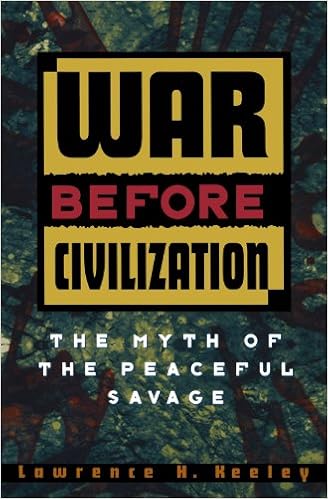You Might Want to Reconsider That
 The
myth of the “noble savage” has given impetus to a rising movement which seeks
to replace Columbus Day with Indigenous Peoples’ Day—a day which celebrates
the contributions of Native Americans and recognizes the enormous historical injustices
committed against them by Europeans and Americans.
The
myth of the “noble savage” has given impetus to a rising movement which seeks
to replace Columbus Day with Indigenous Peoples’ Day—a day which celebrates
the contributions of Native Americans and recognizes the enormous historical injustices
committed against them by Europeans and Americans.
But, the
history of indigenous peoples is plagued by the same demons that afflict
European and American history. It is no more
worthy of celebration than the morally defective Christopher Columbus.
In
his book, War Before Civilization, archaeologist, Lawrence
H. Keeley, “concludes that the idea of the Noble Savage is essentially
nonsense, that in fact primitive warfare was more brutal and intense and
probably less ritualized than its civilized counterpart” (New York Times
review).
After examining archaeological
evidence from numerous tribal societies, including pre-Columbian Native
Americans, Keeley tells us that 90%-95% engaged in war. Among Native Americans, only 13% did not
engage in wars at least once per year.
The attrition rate in many,
close-quarter battles, which are typical in tribal warfare, produced casualties
up to 60%. Compare that to an average
attrition rate of 1% of the combatants in modern warfare.
Massacres occurred among both Canadian and American tribes, including Eskimos. Pre-Columbian Indians used human scalps as trophies and the Iroquois slowly tortured to death captured enemy warriors.
At Crow Creek in South Dakota, archaeologists found a mass grave
containing the remains of more than 500 men, women, and children who had been slaughtered,
scalped, and mutilated during an attack on their village a century and a half
before Columbus's arrival (ca. 1325 AD).
This amounted to more than 60% of the village’s population. Evidence indicates that the tribe’s young
women were abducted.Massacres occurred among both Canadian and American tribes, including Eskimos. Pre-Columbian Indians used human scalps as trophies and the Iroquois slowly tortured to death captured enemy warriors.
Historical distance, observes the New York Times reviewer, “has made the heart grow fonder and the mind mushier, and the sentimentalization of the savage has proceeded apace, even in the face of hard contradictory evidence.”
As Keeler concludes, "If Westerners have belatedly recognized that they are not the crown of creation and rightful lords of the earth, their now common view of themselves as humanity's nadir is equally absurd."
On Columbus Day you have every right to be thankful that you don’t live in a primitive, tribal society.
___________________________________________
NOTE: Max Rosen has produced several detailed graphs of the data based on six sources, including Keeler’s book. See https://ourworldindata.org/ethnographic-and-archaeological-evidence-on-violent-deaths/

https://en.wikipedia.org/wiki/War_Before_Civilization (Wikipedia summary)
http://www.nytimes.com/1996/07/18/books/books-of-the-times-even-in-eden-it-seems-war-was-hell.html (New York Times book review)
